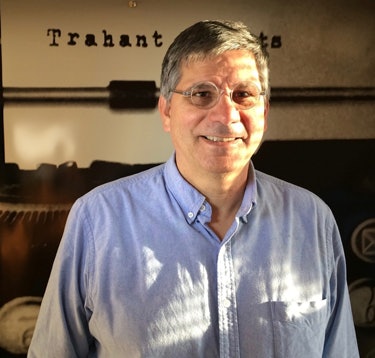Native American journalist and professor Mark N. Trahant will organize a previously denied journalism lecture series, bringing reporters who covered the Dakota Access Pipeline at Standing Rock to the University of North Dakota (UND).
 Mark N. Trahant
Mark N. TrahantAfter Trahant garnered media attention last Thursday for his decision to leave his endowed professorship following his proposal’s earlier denial, UND announced Friday that it would move forward with the journalist’s lecture series.
“This is an important conversation for North Dakota,” Trahant said of the Standing Rock demonstrations. “They’ve really got to come to an understanding of what happened, and then there has to be a healing process. This is still a very divided state, and this is where the university can play just a key role.”
Before the university switched its position to host the journalism lecture series, Trahant, an independent journalist and the Charles R. Johnson Endowed Professor of Journalism at UND, claimed that it was a fear of retaliation from the state legislature that influenced senior administration at UND to put his series on hold.
Last year, Trahant proposed hearing from journalists who covered Standing Rock after the university asked him to coordinate a journalism lecture series. This series was “put on hold,” he said. This year, the professor proposed a conference on technology and society that would lead with conversations on social media’s role in shaping the Standing Rock narrative.
Demonstrations at Standing Rock started as a grassroots movement in April 2016 to protest the construction of the Dakota Access Pipeline, where Standing Rock tribe members saw the pipeline as a threat to regional lands and water sources. Protests sparked the social media hashtag “#NoDAPL.”
The second proposal’s denial prompted Trahant to express his disappointment with the university, which he thought should be an institutional leader and “beam of light, shining on the protected realm of rational discourse,” an October 26 Facebook post said.
A statement by Peter B. Johnson, interim vice president for university and public affairs at UND, refuted any claims of fear of legislative retaliation, and added that the university engages in topics that explore the full spectrum of positions related to those topics:
“The University of North Dakota senior administration has never, to my knowledge…expressed any fear of retaliation by the North Dakota Legislature or by North Dakota legislators related to academic content,” the statement read.
“President [Mark] Kennedy does like the idea of an event that takes a balanced look at the DAPL issue,” Johnson concluded in a statement to journalists.
With his event now scheduled for March 2018, Trahant is reaching out to speakers and other journalists with plans to expand the series into an all-day conference.
Jenni Monet, a Native American journalist who was arrested while covering the demonstrations at Standing Rock, already has accepted Trahant’s invitation and will serve as the keynote speaker for the series. As for the university’s participation, Trahant says, “they’re all on board with the series.”
In a Facebook post update, he stated that the university’s “Hagerty Lecture” will offer a “serious examination” of the media and Standing Rock: “Ideally we will look at two areas, independently, the role of the news media and how a narrative was created and shared via social media,” Trahant said.
Trahant’s efforts to establish the journalism lecture series and his role as a Native American journalist call attention to the issue of diversity in the newsroom. He is a member of the Shoshone-Bannock Tribes in Idaho and he is a former president of the Native American Journalists Association.
“In this field, in this area, there just aren’t many minority journalists,” he said. “That’s one of the things that needs to change. Early on with Standing Rock, there just wasn’t a lot of coverage. People didn’t understand why it was a story, and there weren’t folks in the newsroom from Indian Country who could say, ‘This is really huge. Here’s why we need to cover it.’
“And that’s way beyond North Dakota,” Trahant continued. “That was just a huge problem early on in the story.”
Trahant says that the premise for his lecture series comes out of a need for conversations, such as those about the Dakota Access Pipeline and Standing Rock, involving the larger community.
“I thought, ‘What a great place here at North Dakota. You could invite people who are right there on the spot just five hours away from here,’” he said. “I think given all that’s happened, it’s really progress and I love to see that.”
Plans for the lecture series are underway but Trahant’s decision to not renew his endowed professorship still holds, as he is “thinking newsroom, not classroom.” He told Diverse he will leave his professorship at the end of his three-year term in May 2018.
Tiffany Pennamon can be reached at [email protected]. You can follow her on Twitter @tiffanypennamon.



















